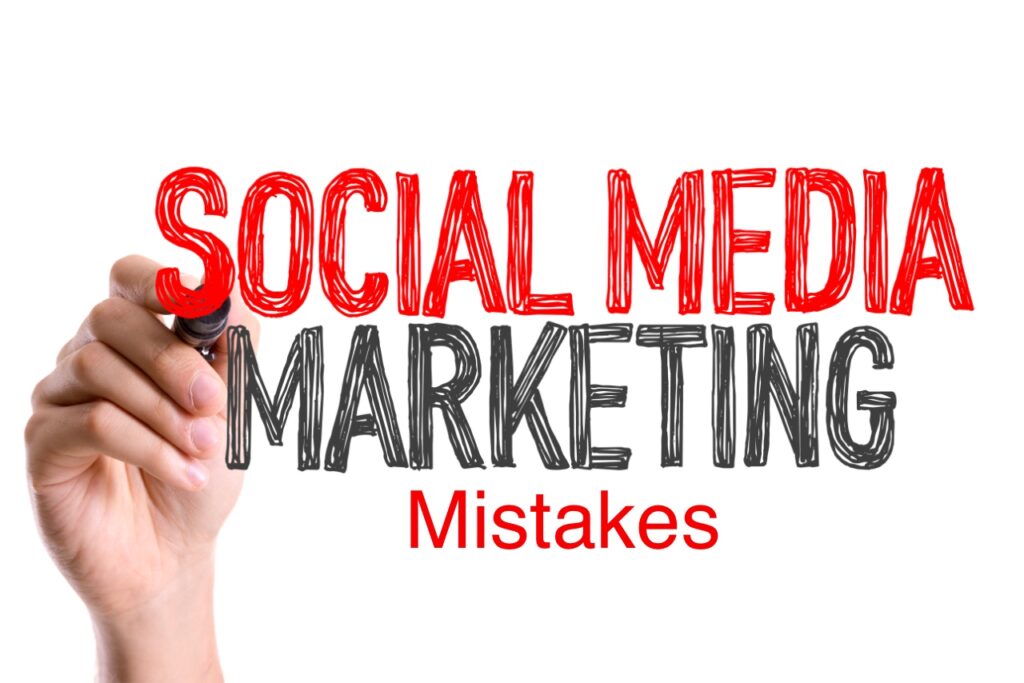In today’s digital age, social media has become an integral part of our lives. With billions of people active on various social platforms, it has evolved into an indispensable tool for businesses to reach and engage with their target audience.
However, like any marketing strategy, social media marketing is not without its challenges.
Many businesses make critical mistakes that can hinder their success and impact their brand reputation.
In this comprehensive guide, we will explore the most common social media marketing mistakes and provide insights on how to avoid them.
Table of Contents

Inadequate Planning and Strategy
One of the biggest mistakes in social media marketing is diving into the process without a well-defined plan or strategy.
Without clear objectives, target audience identification, and an understanding of the platforms’ dynamics, businesses risk wasting valuable time and resources.
To avoid this mistake, it is essential to outline specific goals, create a content strategy, and identify key performance indicators (KPIs) to measure success.
Lack of Consistency
Consistency is key in social media marketing. Posting sporadically or irregularly can lead to a decline in engagement and followers.
Failing to maintain a consistent posting schedule and brand voice can make it challenging for your audience to connect with your brand.
Develop a content calendar, establish a consistent posting frequency, and ensure your messaging aligns with your brand values and personality.
Ignoring Audience Engagement
Social media is not a one-way street. It provides an opportunity for businesses to engage and interact with their audience actively.
Ignoring or neglecting audience comments, messages, and mentions can lead to a negative perception of your brand.
Always respond promptly and thoughtfully to user engagement, including both positive and negative feedback.
Engaging with your audience helps build relationships, fosters loyalty, and enhances brand reputation.
Overlooking Analytics and Insights
Social media platforms offer robust analytics and insights that provide valuable information about your audience’s behavior, preferences, and engagement patterns.
Failing to analyze these metrics can result in missed opportunities for optimization and improvement.
Regularly review and analyze your social media analytics to identify trends, understand what content resonates with your audience, and refine your strategy accordingly.
Lack of Visual Appeal
Social media is a visual medium, and neglecting the importance of high-quality and visually appealing content can hamper your marketing efforts.
Low-resolution images, poorly designed graphics, and inconsistent branding can negatively impact your brand perception.
Invest in professional visuals, maintain consistent branding guidelines, and ensure your content is visually appealing, relevant, and shareable.
Neglecting Platform-Specific Optimization
Each social media platform has its unique characteristics and user demographics. Neglecting platform-specific optimization is a grave mistake.
What works on Instagram might not necessarily work on LinkedIn.
Tailor your content to fit each platform’s format, engage with the specific audience, and leverage platform-specific features such as hashtags, stories, or live video to maximize your reach and engagement.
Over-Promotion and Sales-Oriented Approach
Social media platforms are primarily used for socializing and connecting with others.
Bombarding your audience with excessive promotional content or adopting a sales-oriented approach can lead to disengagement and unfollows.
Strike a balance between promotional and informative content, provide value to your audience, and focus on building relationships rather than immediate sales.
Inauthenticity and Lack of Transparency
Authenticity and transparency are highly valued by social media users. Attempting to deceive or manipulate your audience with fake reviews, endorsements, or misleading content can severely damage your brand reputation.
Be honest, transparent, and authentic in your social media interactions, and avoid any practices that compromise trust.
Failing to Keep Up with Trends:
Social media is a dynamic landscape that is constantly evolving. Failing to keep up with the latest trends and changes can render your social media efforts outdated and ineffective.
Stay informed about emerging platforms, new features, algorithm updates, and industry trends.
Regularly research and adapt your strategy to incorporate new trends and technologies to stay relevant and maintain a competitive edge.
Neglecting Influencer Marketing
Influencer marketing has become a powerful strategy for businesses to leverage the reach and credibility of social media influencers.
Neglecting influencer marketing or approaching it haphazardly can be a missed opportunity to reach a wider audience and gain credibility.
Take the time to research and identify relevant influencers within your industry, establish genuine relationships, and collaborate on campaigns that align with your brand values and target audience.
Lack of Social Listening
Social media provides a treasure trove of insights and conversations about your brand, industry, and competitors.
Neglecting social listening, which involves monitoring and analyzing conversations about your brand and industry, can cause you to miss out on valuable feedback, opportunities for engagement, and even potential crises.
Use social listening tools to monitor brand mentions, relevant keywords, and industry trends to proactively engage with your audience and address any issues promptly.
Overlooking Paid Advertising Opportunities
While organic reach and engagement are valuable, overlooking paid advertising opportunities on social media can limit your brand’s visibility and growth potential.
Paid advertising allows you to target specific demographics, amplify your reach, and drive desired actions.
Consider incorporating paid social media advertising into your marketing mix to complement your organic efforts and maximize your results.
Neglecting to Test and Optimize
Testing and optimization are crucial aspects of social media marketing. Failing to test different content formats, headlines, calls-to-action, and targeting strategies can prevent you from identifying the most effective approaches for your audience.
Implement A/B testing, analyze results, and optimize your campaigns based on data-driven insights.
Continuous testing and optimization will help you refine your social media strategy and improve overall performance.
Failure to Monitor and Manage Online Reputation
Social media plays a significant role in shaping a brand’s online reputation. Failing to actively monitor and manage your online reputation can have detrimental consequences.
Negative comments or reviews left unaddressed can damage your brand’s image. Regularly monitor social media platforms for mentions, reviews, and comments related to your brand, promptly address any negative feedback, and proactively engage in reputation management to maintain a positive brand perception.
Lack of Integration with Overall Marketing Strategy
Social media should not exist in isolation from your overall marketing strategy. Lack of integration can lead to inconsistent messaging, disjointed campaigns, and missed opportunities for synergy.
Ensure your social media efforts align with your broader marketing goals, integrate with other channels, and work cohesively towards your business objectives.
Conclusion On Social Media Marketing Mistakes
Social media marketing offers immense opportunities for businesses to connect, engage, and build relationships with their target audience.
However, avoiding common mistakes is crucial to achieving success in this dynamic landscape.
By recognizing and proactively addressing the mistakes outlined in this comprehensive guide, businesses can refine their social media strategies, enhance their brand reputation, and drive meaningful results.
Stay informed, adapt to changes, and continuously learn from your experiences to create a successful social media marketing strategy.




